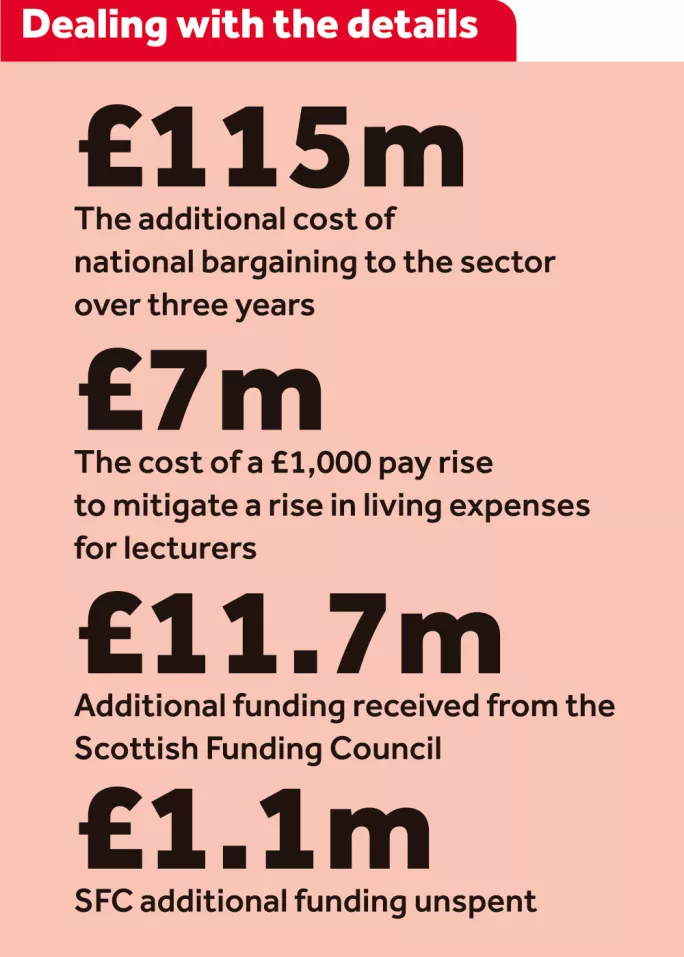Highlands lecturer costs to rise by up to two-thirds

The financial implications of the ongoing FE national bargaining process for institutions in the Highlands and Islands are “very serious”, the vice-principal of University of the Highlands and Islands (UHI) has said. Meanwhile, the total cost to the Scottish sector may be £115 million over three years, according to figures from Colleges Scotland.
All of UHI’s colleges will have their base costs for lecturers increase significantly - by as much as 39.9 per cent at Argyll College and 67.8 per cent at North Highland College - according to confidential cost calculations.
This is because these colleges have historically paid lower salaries, but the agreed harmonisation of college lecturer pay - as a result of the return of national bargaining - means they will now also be moving their staff onto a pay scale toward the highest salary in the sector, of more than £40,000.
College managers and staff unions agreed a pay deal earlier this year - after strike action by lecturers and intervention by education secretary John Swinney - although some of the detail of that deal is yet to be agreed. This, Tes Scotland understands, includes annual leave for promoted lecturers and some details on working hours.
‘Serious’ implications
Diane Rawlinson, UHI vice-principal for further education, said that colleges were differently affected by the introduction of national bargaining, depending on their individual pay models.
“Some of the smaller academic partners of the University of the Highlands and Islands face increases in base pay roll costs of up to 68 per cent,” she explained.
She added: “While colleges in the Highlands and Islands are working with Colleges Scotland and the Scottish Funding Council (SFC) to mitigate any potential negative impact on the student experience in the short term, in the medium to long term the financial implications of this are very serious.”

Colleges in the UHI college region were also constituent parts of the University of the Highlands and Islands, she said, delivering education across all Scottish Credit and Qualifications Framework (SCQF) levels and hosting specialist research centres and institutes.
Ms Rawlinson added: “The tertiary nature of the UHI makes it unique in Scotland and a standard lecturer contract designed for the college sector does not fully reflect the roles many academic staff employed by university’s academic partners undertake. This is an issue that the university will continue to explore in the coming months.”
The cost analysis of the implications of national bargaining shared with Tes Scotland - and marked “confidential” by Colleges Scotland - reveals the estimated cost of all proposed changes to terms and conditions for teaching and support staff at colleges would be more than £115 million. It states that the figures have been “validated by the Scottish Funding Council”.
The data reveals that, of the funding made available by the SFC to mitigate the increase in staff costs, only £1,072,088 remains available in the sector. However, a pay increase of £1,000 for every lecturer to mitigate living costs increases, which is understood to be part of the pay claim demands from the EIS, would cost £7 million - revealing a significant potential funding shortfall.
A spokeswoman for the Colleges Scotland Employers’ Association, which represents college management, said the costs involved in implementing national bargaining were “significant”. She added: “Based on a detailed financial analysis, which has been validated and confirmed by the SFC, it will cost the sector in the region of £115 million over the next three years.
“The sector’s ability to fund the remainder of the agreement will depend on the outcome of the Scottish government spending review. The EIS is fully aware of the sector’s current financial position.”
She said the pay agreement earlier this year, which was arrived at after strike action by lecturers and intervention from the Scottish government, represented an average 9 per cent pay increase - not including the additional claim for £1,000 for living cost increases that lecturers have now asked for.
‘Binding agreement’
EIS general secretary Larry Flanagan said: “The EIS is clear that there is a binding agreement between colleges and the lecturing staff on pay. College management have made a number of claims regarding the affordability of the binding agreement that they freely signed up to.”
He added: “While colleges are within their rights to campaign for additional funding for the sector, this cannot be used as an excuse to wriggle out of binding commitments on pay. The EIS has already taken two rounds of strike action to compel colleges to meet their obligations to lecturers, and will not allow haggling between colleges and the Scottish government over future funding to derail the binding agreement on lecturers’ pay.”
A Scottish Funding Council spokeswoman said: “Colleges have resources to meet the additional costs between April 2017 and July 2018 from increased lecturers’ pay as a result of the agreement between colleges and EIS-Fela. National bargaining costs beyond this date are being considered as part of the spending review.”
You need a Tes subscription to read this article
Subscribe now to read this article and get other subscriber-only content:
- Unlimited access to all Tes magazine content
- Exclusive subscriber-only stories
- Award-winning email newsletters
Already a subscriber? Log in
You need a subscription to read this article
Subscribe now to read this article and get other subscriber-only content, including:
- Unlimited access to all Tes magazine content
- Exclusive subscriber-only stories
- Award-winning email newsletters